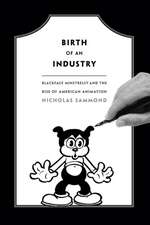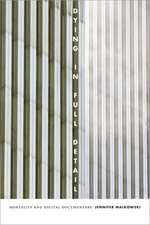The Witch`s Flight – The Cinematic, the Black Femme, and the Image of Common Sense: Perverse Modernities: A Series Edited by Jack Halberstam and Lisa Lowe
Autor Kara Keelingen Limba Engleză Paperback – 4 noi 2007
Din seria Perverse Modernities: A Series Edited by Jack Halberstam and Lisa Lowe
-
 Preț: 218.22 lei
Preț: 218.22 lei -
 Preț: 159.22 lei
Preț: 159.22 lei -
 Preț: 193.83 lei
Preț: 193.83 lei -
 Preț: 207.11 lei
Preț: 207.11 lei -
 Preț: 166.80 lei
Preț: 166.80 lei -
 Preț: 166.04 lei
Preț: 166.04 lei -
 Preț: 150.17 lei
Preț: 150.17 lei -
 Preț: 148.17 lei
Preț: 148.17 lei -
 Preț: 210.26 lei
Preț: 210.26 lei -
 Preț: 193.22 lei
Preț: 193.22 lei -
 Preț: 215.61 lei
Preț: 215.61 lei -
 Preț: 215.92 lei
Preț: 215.92 lei -
 Preț: 196.17 lei
Preț: 196.17 lei -
 Preț: 301.81 lei
Preț: 301.81 lei -
 Preț: 229.47 lei
Preț: 229.47 lei -
 Preț: 204.32 lei
Preț: 204.32 lei -
 Preț: 214.21 lei
Preț: 214.21 lei -
 Preț: 262.14 lei
Preț: 262.14 lei -
 Preț: 221.22 lei
Preț: 221.22 lei -
 Preț: 194.42 lei
Preț: 194.42 lei - 19%
 Preț: 603.61 lei
Preț: 603.61 lei -
 Preț: 266.18 lei
Preț: 266.18 lei -
 Preț: 260.41 lei
Preț: 260.41 lei -
 Preț: 261.38 lei
Preț: 261.38 lei -
 Preț: 211.88 lei
Preț: 211.88 lei -
 Preț: 304.10 lei
Preț: 304.10 lei -
 Preț: 231.12 lei
Preț: 231.12 lei -
 Preț: 228.50 lei
Preț: 228.50 lei -
 Preț: 204.71 lei
Preț: 204.71 lei
Preț: 165.98 lei
Nou
Puncte Express: 249
Preț estimativ în valută:
31.76€ • 33.16$ • 26.23£
31.76€ • 33.16$ • 26.23£
Carte disponibilă
Livrare economică 25 martie-08 aprilie
Livrare express 11-15 martie pentru 22.88 lei
Preluare comenzi: 021 569.72.76
Specificații
ISBN-13: 9780822340256
ISBN-10: 0822340259
Pagini: 224
Dimensiuni: 157 x 231 x 16 mm
Greutate: 0.31 kg
Editura: MD – Duke University Press
Seria Perverse Modernities: A Series Edited by Jack Halberstam and Lisa Lowe
Locul publicării:United States
ISBN-10: 0822340259
Pagini: 224
Dimensiuni: 157 x 231 x 16 mm
Greutate: 0.31 kg
Editura: MD – Duke University Press
Seria Perverse Modernities: A Series Edited by Jack Halberstam and Lisa Lowe
Locul publicării:United States
Recenzii
Kara Keeling offers a tour de force extension of Deleuzes writings: she understands cinema as a form of thought, as well as a motor of a shared sensorium, capable of numbing repetition as well as provocative alternative visions. No Deleuzeobabble here, though, just sweet grooves and careful readings. With lucid and piercing argument, Keeling is a serious critic of black visual culture, following a line of powerful litanies for survival from Frantz Fanon to Angela Davis to Fred Moten.Amy Villarejo, author of Lesbian Rule: Cultural Criticism and the Value of DesireThere is a special alchemy at work in this wonderful project that transforms painstaking research and original theoretical insight into a superb understanding of the cinematics deeply cathected relation to blackness, gender, and sexuality. Kara Keeling watches, reads, and stitches together a tapestry that teaches us how to re-read and re-think what we thought we knew already of visual culture, of the peculiarities of our social orders self-imagination, and of the survival of black femme desire.Wahneema Lubiano, editor of The House that Race Built
Notă biografică
Textul de pe ultima copertă
"There is a special alchemy at work in this wonderful project that transforms painstaking research and original theoretical insight into a superb understanding of the cinematic's deeply cathected relation to blackness, gender, and sexuality. Kara Keeling watches, reads, and stitches together a tapestry that teaches us how to re-read and re-think what we thought we knew already of visual culture, of the peculiarities of our social order's self-imagination, and of the survival of black femme desire."--Wahneema Lubiano, editor of "The House that Race Built"
Descriere
Highlights the ways "the cinematic" structures both racist and sexist portrayals, and their potential undoing










